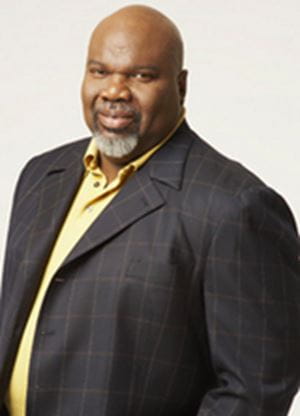
Bishop T.D. Jakes: We were actually working on a script at the time that I thought was rather intriguing. Our storyline was dealing with families and how they overcome secrets and that every family has secrets and issues and so forth and so on. Then I found this script. It was presented to me and I thought that it was so similar in its tone to what we were going to do that we thought that with minor altering we could still project some of the same messages that we wanted to project within the confines of the script.
How does your character play a role?
My character has a very simple role. I mean I’m just a friend of the family that’s been brought in to perform a marriage for a family that I’ve worshiped with for a number of years and so my role there is to help to facilitate that. It’s a very easy role for me to play. I think for me my involvement with the film is not so much focused on acting itself as it is God has blessed me with a relationship with Sony and a conduit to produce films that otherwise would not be produced and to use that judiciously is my calling; to be able to communicate with my generation in every possible form and fashion. Occasionally I will stick my face in front of the camera but I think I’m probably most effective in the process of negotiating the bill that supports the film.
And if someone asked you is this a Christian film how would you characterize this film?
Do you see that’s the direction where faith-based film is starting to go into is more mainstream?
I think we have to go into that. I think that not only faith-based films, all films that are relegated over to particular communities like African American films or what have you are learning that as the world meshes together, as we commune through [the] Internet and through technology that we can no longer isolate any message to one group of people. And I think it’s very, very important to realize that people have an interest in faith. Even those who are not of faith and those are the people that we want to seek to serve. So we have not tried to label it or isolate our message and I think many, many more people are going more mainstream in their scope and their vision [is] to reach a wider audience.
Not Easily Broken was about marriage. [Jumping the Broom] is about marriage. Why a film about marriage?
I think that it’s something that we should look at today as more and more we begin to recognize that some of the largest barriers between people today are not always race but sometimes class and economy. So I think it’s a very contemporary cutting edge look at families and at life and how can two very different families come together in a mass and function effectively and it’s funny and it’s humorous but it’s also real. Anybody who has ever brought one side of the family together with the other side in your own life soon runs into the fact and isn’t that what the church is all about bringing together all types of people. Paul said I became all things to all people that some might be saved. The church is not an elitist club for yuppies who think they have arrived nor either the gathering of ghetto minded people who are oppressed economically but it is an amalgamation of people of diverse walks of life who have heard the clarion call to come to Christ.
I think that this film kind of addresses what all happens when we all try to get together and how we often don’t understand each other and what makes me want to get behind the message is because ultimately they find out that there’s more to unite them than there is to divide them. And I think that’s a message that our country needs to hear at a time that there is so much cynicism and so much animosity being hurled within the human family in general.

